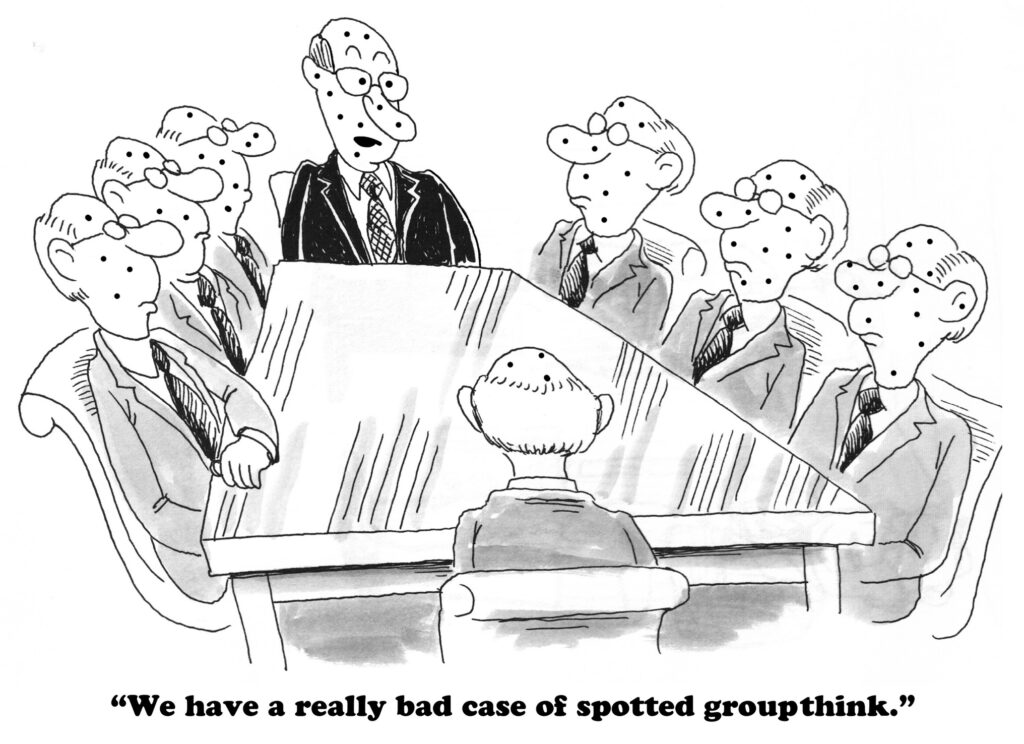
Hard and fast on the heels of the Department of Business and Trade’s report into EDI in the UK (March 2024) and the Free Speech Union’s Dynata Report (April 2024) The Policy Exchange has just published another report on the impact that EDI has had on the UK workplace, and like the previous reports, its conclusions are pretty damning. Steve Chilcott, Co Founder of Fair Job UK takes a closer look at the report and its implications:
More Analysis of EDI in the Workplace
Following years’ of increasing Equality, Diversity and Inclusion initiatives being undertaken across the workplace, 2024 appears to be the year in which this EDI march is being really scrutinised and evaluated. Over the last few months we have had an increasing trickle of reports and analyses into the impacts of EDI, and to date they are not providing a very positive picture. This week another report has come out showing the variable responses that Equality, Diversity and Inclusion initiatives can create within the workplace. The report shows that not all EDI initiatives are having positive impacts, and some are in fact creating quite negative reactions, including the use of some recruitment practices, the use of pronouns in the workplace and the taking up political positions by organisations. The report shows that people are actually most concerned themselves about discrimination against socioeconomic background and about accidentally causing offence at work.
The report which was published on 19 May 2024 was commissioned by the Policy Exchange, a London-based think tank which describes itself as “an independent, non-partisan educational charity whose mission is to develop and promote new policy ideas that will deliver better public services, a stronger society and a more dynamic economy.” The survey was run by Deltapoll, an independent public opinion consultancy, and questioned approximately 2,000 UK adults between 3rd to 7th May 2024.
The use of Pronouns
The report shows that a significant proportion of people do not respond well to an expectation to use pronouns at work. The survey asked “If you were asked to wear a badge with your personal pronouns displayed (i.e he/she/they), do you think having to wear a badge like this would make you more or less likely to want to continue working for a company?” A significant 43% said it would make them less likely to stay, with only 7% saying it would make them more likely to stay. A clear negative reaction to any enforcement of pronouns within the workplace.
The Recruitment Process
The report covered a number of different EDI aspects that are often used in the recruitment process. 75% of people felt that employers should appoint or promote the most qualified person for the job, without taking into account factors such as race or gender. Only 15% felt employers should appoint or promote people in a way that creates a diverse team which reflects the makeup of the UK. This clearly indicates that recruitment decisions based purely on merit are considered by the majority to be correct.
Employers frequently like to include grand statements on their values within their recruitment materials such as job adverts. When comparing a customer service delivery value against an ethical EDI statement, the majority preferred the customer service delivery statement. 61% preferred “We are passionately committed to delivering excellent customer service and always doing right by our customers. You will be joining a skilful and driven team united by a commitment to fostering innovation and strong partnerships”. Just 28% preferred “We are an ethical company who always prioritise creating a diverse and inclusive space for everyone. We encourage all employees to bring their whole self to work and provide regular empowerment training sessions, workshops and events. We are particularly seeking applications from women, people from an ethnic minority background and people from the LGBT+ community.”
A statement that many employers now make is that their organisation operates a ‘take your whole self to work’ policy. 51% did feel such a policy can create a more open working environment where everyone is free to express their views, though 24% felt that in practice, such a policy can create a less open working environment in which only some views are accepted.
The survey questioned perceptions around applicant success in recruitment processes. 59% believed that when a male and female with the same qualifications and experience apply for the same job, they both have the same likelihood of getting the job. Unfortunately 10% thought the female is more likely to get the job and 25% the man.
When considering recruitment of different ethnicities with the same qualifications and experience, 53% felt ethnic minority and white candidates will have the same likelihood of getting the job, 17% believe the ethnic minority candidate will have a higher likelihood of getting the job and 23% believe the white candidate will have a higher likelihood. When Asian and White individuals were asked this question their answers were reasonably the same. Black individuals however, felt the likelihood of White applicants being successful was much higher at 45%.
A concerning 34% felt that in their workplace, people are sometimes hired or promoted to meet diversity and inclusion objectives, rather than in the best interests of the company. That worryingly rose to 44% when Black individuals responded.
So even though a significant proportion of people feel recruitment processes are fair on the front of both sex and ethnicity, there are not insignificant proportions of people who believe that their can be favouritism to both the group who may be considered to be historically favoured but also to the group who may have been historically discriminated against, i.e. women and ethnic minorities.
Organisational Political Viewpoints
The survey asked if an organisation publicly shared specific political viewpoints, how this would impact people’s views of them, specifically whether it would impact their decision to buy the organisation’s products. On each of the examples given, the lowest level of response given was that the expressed view would have a positive impact, increasing the likelihood of people buying the organisation’s products. In most of the examples, the proportion of people stating the expression of the view would have a negative impact on their likelihood of buying the organisation’s products is slightly higher than the positive impact. For each example, by far the largest response was that it would have no impact. The overall impacts considering the negative and positive impacts collectively are all negative, with the exception of BLM which has a very small overall impact of +1%.
| More likely(a) | Less likely(b) | No difference | Overall impact(a – b) | |
| Support for racial targets or quotas in their workforce | 16% | 21% | 51% | – 5% |
| Opposition to Govt policy of reducing immigration | 15% | 24% | 48% | – 9% |
| Support for Black Lives Matter | 21% | 20% | 50% | + 1% |
| Support for a Palestinian State | 16% | 20% | 47% | – 4% |
| Support for transgender rights | 17% | 22% | 52% | – 5% |
The above results therefore suggest that the expression of political views is unlikely overall to have any positive impact on commercial success. In fact when asked, 50% of those surveyed felt that businesses have become too concerned with taking political positions on contested issues. Only 14% disagreed and felt they have not.
EDI Training
When asked whether some of their working time is wasted by training or other activities related to EDI, 28% felt that it was, 35% felt it wasn’t a waste of time, though 37% expressed no view. Not an overwhelming endorsement of EDI training.
Other EDI initiatives
28% felt that in their workplace, managers are too sensitive to complaints by employees who are women or ethnic minorities, though 29% disagreed that they’re too sensitive. However, a much higher proportion, 51% of Black staff felt managers are too sensitive.
Socioeconomic background is often discussed less than the legally defined protected characteristics. However, the survey tells us that a number of people feel that in the workplace you are more likely to be discriminated against for having a working class accent than because of your ethnicity. 30% agreed with this statement and 24% disagreed, though a higher proportion, 43% of Black staff agreed that a working class accent can be discriminated against more than ethnicity.
If an employer organises regular events to celebrate and champion causes like LGBT+ Pride and Black Lives Matter, 31 % think this is more likely to make everyone (or most) feel welcome at the company. However, 22% think this will make it clear to some employees that certain types of views are not allowed at the company.
A concerning 49% stated that they sometimes avoid saying professionally legitimate things at work for fear of not being sufficiently politically correct or of accidentally causing offence. This rose to an incredible 71% for Black staff. 46% said they rarely or never avoided saying things for fear of being politically correct or of accidentally causing offence, but only 28% Black staff.
Conclusions
Organisations need to thoroughly evaluate their own EDI initiatives, ensuring they understand exactly what their desired outcomes are and then carefully evaluate the initiatives against those desired outcomes. They must pay particular attention to other potential consequences to EDI initiatives, particularly unintended consequences. This latest report, and others, are showing that the actual impact of EDI initiatives can be the very opposite of what is intended. Employers must take care that initiatives are not just performative but actively achieve the desired outcomes.
Might the enforced use of pronouns actually make many people less likely to stay with their employer? Are all recruitment decisions made purely on merit? Different staff will have different perceptions on the fairness of recruitment, often polar opposite perceptions. Making grand statements, for example that you are an ethical, diverse and inclusive organisation does not impress many. Organisations making political statements appear to result in no positive increase in customers, in fact can deter customers. Many people have concerns that socioeconomic background is actually more likely to be discriminated against in today’s workplace, rather than protected characteristics such as ethnicity, including amongst ethnic minority staff themselves. And finally, we are again seeing that many people are generally worried about what they say at work, and even avoid saying professionally legitimate things at work for fear of not being politically correct or accidentally causing offence – a culture of anxiety and treading on eggshells. This is felt considerably more by Black staff.



